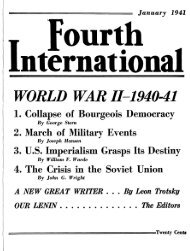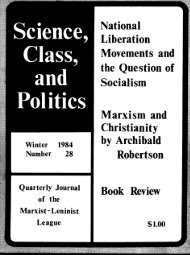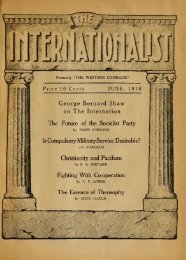The Stalin school of falsification - Marxists Internet Archive
The Stalin school of falsification - Marxists Internet Archive
The Stalin school of falsification - Marxists Internet Archive
Create successful ePaper yourself
Turn your PDF publications into a flip-book with our unique Google optimized e-Paper software.
<strong>Stalin</strong> School <strong>of</strong> Falsification - Chapter 7<br />
having had "guilty knowledge" <strong>of</strong> a secret faction organized by Syrtsov, Lominadze, Shatskin and Sten,<br />
and for having failed to inform the party authorities. Once more, Zinoviev and Kamenev presented a<br />
statement <strong>of</strong> recantation, even more humiliating than the first; they were again readmitted in 1933. From<br />
then on, their self-debasing statements continued periodically, until January, 1935, when they admitted<br />
"moral complicity" in the assassination <strong>of</strong> S. M. Kirov in Leningrad, for which they were sentenced,<br />
along with a number <strong>of</strong> their real and alleged political associates, to prison sentences ranging from five to<br />
ten years. In August, 1936, they were once more accused <strong>of</strong> complicity in the assassination <strong>of</strong> Kirov, but<br />
this time <strong>of</strong> direct responsibility. Less than two weeks after the opening <strong>of</strong> the tragically farcical trial,<br />
they were executed along with fourteen other defendants. [BACK TO TEXT]<br />
34. <strong>The</strong> "literary discussion" was launched in 1924 in the Russian party on the pretext <strong>of</strong> the publication<br />
<strong>of</strong> <strong>The</strong> Lessons <strong>of</strong> October (Eng. trans. New York, 1937), which examined the problems <strong>of</strong> revolutionary<br />
strategy and tactics in the German Revolution <strong>of</strong> October, 1923, in the light <strong>of</strong> the instructive internal<br />
disputes which developed in the Bolshevik Party during the year 1917 over the question <strong>of</strong> the<br />
insurrection which finally occurred in Novem ber. Trotsky's work, an introduction to his volume 1917,<br />
was almost universally condemned by the various Communist parties on command from Moscow, but<br />
not one person in a hundred called upon to condemn it, ever laid eyes on it. In fact, in the American<br />
Communist Party, the press was called upon, at one and the same time, to condemn Trotsky's work and<br />
to refrain from publishing it! <strong>The</strong> Central Executive Committee <strong>of</strong> the party issued the following decision<br />
to all part; editors: "You will find attached hereto an English translation <strong>of</strong> a review <strong>of</strong> comrade Trotsky's<br />
Book 1917 entitled 'How One Should Not Write the History <strong>of</strong> October.' By decision <strong>of</strong> the Central<br />
Execu tive Committee all party papers are instructed to reprint this Pravda review within ten days time.<br />
It is the further instruction <strong>of</strong> the Central Executive Committee that no party paper shall reprint the book<br />
1917 or any chapter there<strong>of</strong> in the party press. It is the view <strong>of</strong> the Central Executive Committee <strong>of</strong> the<br />
Workers [Communist] Party <strong>of</strong> America that the publication <strong>of</strong> Trotsky's book in this country would be a<br />
detriment to the work <strong>of</strong> Bolshevizing the Workers Party which is the most important task before our<br />
party. <strong>The</strong> Central Executive Committee regrets to note that the Volkazeitung [the party organ in German<br />
at that time] has already begun publication <strong>of</strong> the book serially. It has instructed the Volkszeitun'q to<br />
discontinue the publication and further instructs all other party papers that neither the book as a whole<br />
nor any chapter there<strong>of</strong> is to be reprinted in the party press. . . . Central Executive Committee, W. P. <strong>of</strong><br />
A., Wm. Z. Foster, Chairman, C. E. Ruthenberg, Executive Secretary." (Daily Worker, December 18,<br />
1924.) It was therefore a "detriment to the work <strong>of</strong> Boishevizing" the American Communist movement to<br />
make available to the membership Trotsky's essay so that they might at least know the contents <strong>of</strong> what<br />
they were instructed to condemn as counter-revolutionary. [BACK TO TEXT]<br />
35. On October 16, 1926, the recently formed Opposition, faced with the threat <strong>of</strong> expulsion which<br />
would prematurely cut them <strong>of</strong>f from contact with the party membership, issued a statement to the party<br />
in which the pledge is made to cease advocating their views in the intensely sharp factional form which<br />
the struggle had assumed by that time. <strong>The</strong> increasingly repressive and bureaucratic measures taken by<br />
the <strong>Stalin</strong>ist leadership, plus the decisive importance <strong>of</strong> the events in England and especially in China,<br />
made it impossible to conduct the struggle against the decadent bureaucracy in the form pledged by the<br />
statement. [BACK TO TEXT]<br />
Return to Index Page — Next Chapter<br />
http://www.marxists.org/archive/trotsky/works/1937-st2/sf07.htm (7 <strong>of</strong> 8) [06/06/2002 15:06:38]

















